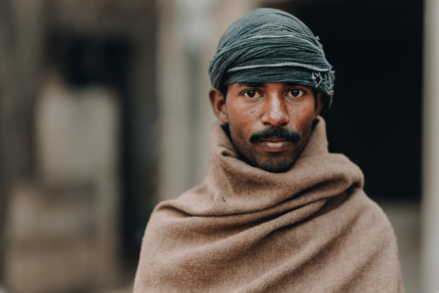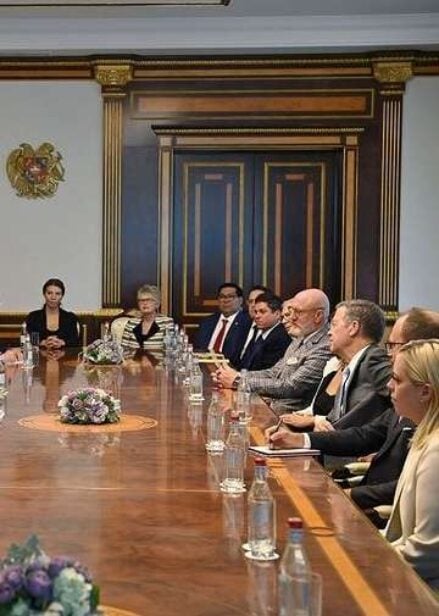Q: What is the significance of the outcome of the election results?
RBM: The Hindu nationalist Bhartiya Janata Party (BJP) will form a third consecutive government, which is historic as Narendra Modi will be only the second person to have a third term. However, more significantly, they no longer form a majority government on their own. They must enter into a coalition with more regional parties for the first time under Modi’s tenure. That changes a lot.
Q: Was this a surprise?
RBM: It came as a seismic shock. Modi campaigned on increasing the number of BJP-led coalition members of the national Parliament to 400. His slogan, “Abki Baar 400 Paar,” meant “this time surpassing 400.” Modi said that the BJP by itself would win over 370 seats instead of 303 in the last election. They were super confident, if not of getting 400, which was frankly a bit unrealistic, but definitely of securing around 350 to 370. The exit polls appeared to confirm a landslide.
Then to their shock, the BJP garnered only 240 seats, down 63 from the previous election. A government must command at least 272 seats for the Parliament to form a government. Now, the BJP will be reliant on other political parties as never before. Also, the opposition coalition garnered 233 seats, far above what was predicted.
Q: Is this India election surprise a huge blow for Modi?
RBM: His aura of invincibility is gone at a stroke. He had a huge personality cult. And it came from success. The BJP before him always had to find coalition partners to govern because the appeal of hard Hindutva was too limited. Modi added populism to the ideology. With his mesmerizing communication skills, he convinced many of the absolute lowest-income and lower caste to vote for him, thus giving the BJP absolute majorities in the last two elections.
It is a fact that most Hindus in India are not fans of a Hindu supremacy narrative. The ideology is very Brahminical, meaning high caste. So, it takes something special for groups of people who are not included in this communal and sectarian vision for India to back it. Modi was the alchemist who found this extra appeal. Part of it was his personality. Another part of it was his promise to prosper India for everyone. A big part was preying on the fears of Muslim domination and attacking conversions to Christianity.
For the first time in ten years, Modi lost his touch. The low-income have taken their revenge on him at the ballot box. He will never have the same aura again. In fact, the knives will be out for him within his own party.
Q: How could the BJP have misread the political situation so badly?
RBM: There is a word you hear a lot about India under the BJP: corporatization. Essentially it means that the institutions of the country have been sold off to business elites—often the buddies of Modi from Gujarat state. The country is in thrall to the corporates. That means only the rich are getting richer. Take the media, for example; two billionaire friends of Modi control 82% of all Indian media. Never in the history of the world have two people controlled what over 1 billion people see and read.
This new media is set up to fawn over the BJP and Modi himself … no wonder they missed the story. They were too busy following the party line that the BJP was heading for a landslide. That makes the shock all the more brutal, but that is what happens when you create a corporatized institution. It cannot tell the truth anymore because it learned to stick to safe, ideological slogans.
Q: Why did the BJP lose so much ground in this India election?
RBM: Two major factors reared their heads. One was those with low income decided that the BJP were not running India in their interests. There are 300 million Dalits in India, those who fall below the caste system, and a further 300 million Other Backward Castes, or low caste. Unemployment has been very high among those groups. They see India booming—but not for them. They no longer voted BJP in big numbers, especially in the Hindu nationalist heartland of Uttar Pradesh, India’s most populous state.
The other is that the opposition Congress party in particular ran a “warning” narrative. Their claim was that the BJP were gunning for the pluralistic character of the Constitution and would attempt to change it in order to declare India a Hindu Rashtra, or Hindu nation. At the moment, the Constitution binds the State to be neutral between India’s various religions, a healthy secularism that has been under attack. This also gained some traction even though the BJP never said in as many words that they were out to alter the Constitution. The trickery of the BJP rebounded on them when they concocted bogus reasons to freeze the bank accounts of Congress and jailed opposition leaders just prior to the election campaign.
Q: Has India changed that much since Modi took power in 2014?
RBM: Modi is an unabashed Hindu nationalist, and even level-headed Christian leaders think that he has created a new ruling class, even a new India. As one of them said as recently as March, “It is no longer easy to affirm that I am a Christian and I am an Indian.”
Nationalism has come to the fore so that the distinction between ‘Hindu-ness’ and ‘Indian-ness’ has been severely eroded. Considerable numbers of Muslims and Christians have felt culturally marginalized like never before. On the ground, it’s worse. There is no doubt that BJP rule unleashed a hard edge of unaccountable violence against religious groups. As one Christian leader put it last year, “The BJP have normalized hatred.”
The Evangelical Fellowship of India has been tracking violent incidents against pastors and churches. Last year, they recorded their highest ever count: 601 incidents. It’s a mark of how much India has changed that I cannot quote the persons who spoke out about this because they may be endangered by speaking out about this trend. Prior to 2014, this was not an issue.
Q: When it comes to Christian persecution, how is the Indian church singled out in particular?
RBM: In addition to the cultural marginalization that has taken place, there are two main tactics that stand out. First, the BJP have deliberately starved churches of their foreign funding on a vast scale. The mechanism the government began using was the suspension or cancellation of licenses under the Foreign Contribution Regulation Act (FCRA), which permits non-governmental organizations (NGOs) to receive funds from abroad.
According to The Hindu newspaper, more than 16,000 NGOS have had their FCRA registration cancelled due to “violations” over the past nine years. This has forced major Christian charities like World Vision and Compassion International to stop most of their activities. It has seriously compromised the ability of the churches to help the poorest and most vulnerable in India.
The second tactic is to smear the whole concept of “mission” and concoct criminal charges against prominent Christians. These are old lies. It is falsely claimed that Christians only convert others by unethical means—for example, by offering food or aid in exchange for a conversion. Or the lies take a bizarre turn, falsely claiming that Christians are agents of Western powers seeking to take over India. The criminal lies levelled against pastors usually focus on fraud. They need not be proven, and indeed rarely are, but they smear reputations, spread disunity, and on occasion, stop ministries.
It’s been quite tough. Sure, India is a big place, and religious persecution is patchy when it comes to violence. But when the violence erupts, it is terrible. Last year, we saw a Hindu nationalist-inspired plan to take over lands from a Christian group, the Kuki, in the northeast state of Manipur. Coordinated violence in two days in the capital city of Imphal saw hundreds killed, dozens of churches burned, and 60,000 Kuki Christians permanently displaced.
Most sickening was seeing the police turn up to protect a church from an organized mob, only to stand down after receiving a phone call from the BJP authorities who are in charge in the state. There will be another incident like Manipur for sure in the next few years.
Q: Will Christian persecution in India be reduced because of this surprise election result?
RBM: I think we can say that the agenda to alter the Constitution is stopped for now, and the formally plural character of India as a nation will remain intact. Much will depend on the BJP’s electoral partners, two of whom come from regions where there are large Christian and Muslim communities, and little love of Hindutva ideology. Many Christian leaders are breathing a huge sigh of relief.
However, there are two responses I suspect we will see that will make things more difficult. First, the BJP will continue with its stealthy capture of key institutions of society—education, the judiciary, and the media. Indeed, they may even redouble their efforts. The past ten years have seen them hollowing out these areas and compromising their power to hold the government accountable. For example, who is going to reinstate 16,000 NGOs who have had their FRCA registrations cancelled?
Second, the Rashtriya Swayamsevak Sangh (RSS), which translates to “National Volunteer Association,” will respond with a “bottom layer blitz.” The RSS is the world’s largest far right para-military NGO, and the guiding force behind Hindutva ideology. They have an estimated 3 million members in 60,000 daily meetings and have been humiliated by this election result. The RSS should have known the Dalits in particular were losing their faith in the BJP, but they didn’t. Now, they will get back to those areas where the BJP did not do well. They’ll work at the village level to bolster support for the hard Hindutva message they stand for.
It’s a hugely efficient organization. When the BJP unexpectedly lost the national election in 2003, they fanned out into the villages and replaced the Christian churches as the primary providers of education in the country. This was crucial to Modi’s success in 2014. Indeed, he has been an RSS member since he was eight years old. Expect a response on the same scale now. I was recently in Varanasi and heard of them sending out teams into the countryside to teach Hindus how to make police complaints about the number of new Christians in the villages. The ideology of Hindutva is in their hands, not Modi’s, who may be more egotist than ideologue.
Q: Is the persecuted church in India ready for what lies ahead?
RBM: India is full of capable Christian leaders, but they would admit they have been outclassed and out-organized by the Hindu nationalists so far. The Christian leaders are not coordinated enough in their response to be effective yet. The election result will give them hope, but most of the church still needs to wake up to what’s going on.
I heard a great Indian church leader thunder in Delhi recently, “We need to create communities of faith that are uncomfortable with the situation in India. The best place to go to ignore this is the church, where people hear the comfortable stuff. We just refuse to accept our nation has changed, and not in a good way.” I talked to church leaders as far away from Delhi as you can get. They were embarrassed by religious leaders groveling at Modi when the Prime Minister attended a Christmas service. They will need to rehabilitate the connection between Christianity and democracy as the fight for the soul of India is still on. And they will need to get smarter tactically.
Q: Is India a growing church? Are Hindus becoming Christians because they want the dignity Christianity provides?
RBM: The Indian church is one of the great wonders of the Christian world right now. I heard a top leader of a Christian college sum it up in this amazing way: “We took 200 years to get to 2.3 percent—and only 20 years to get to 7 percent.” That is referring to the fact that there has been a great revival in India in the past twenty years, mostly among Hindus. The fact is, 7% is enormous, and right now we do not have statistical back-up for such statements. But remember, that would place the Christian church in India at over 100 million people. Most scholars have estimated about 70 million in the meantime. But it’s accepted that about 30 million Hindus have become Christ-followers in the last 20 years.
They are called Christ-followers because they don’t register as Christians. In many cases this is because they are low caste, and don’t want to give up their “reservation” status. But there is another reason, too. These new believers have encountered Jesus as a healer first and foremost. They also enjoy the equality that Christianity offers, in contrast to Hinduism where untouchable castes are not even allowed to approach temples at all. Everyone is equal in Christian worship. Lastly, they get dignity, but that comes after healing and equality. It’s an amazing story, and up there with the growth of the sub-Saharan African church and the Chinese church as one of the great trends in the Christian kingdom. Underneath the pressure in India, there is such a lot to be thankful for.
About Dr. Ron Boyd-MacMillan
Ron is the Director of Global Strategy and Research at Global Christian Relief. A leading expert on Christian persecution, he is also the author of Faith that Endures: The Essential Guide to the Persecuted Church—the first comprehensive text on how to understand, support, and learn from the persecuted church.








